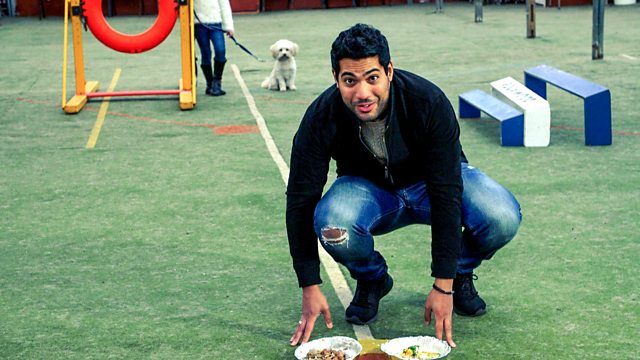
Welsh consumer magazine. Do dogs prefer home-cooked food? Omar Hamdi rustles up a dog's dinner and investigates the trend for home cooking for your pet.
Welsh consumer magazine presented by Lucy Owen, Omar Hamdi and Rachel Treadaway-Williams.
Do dogs prefer home-cooked food? Omar rustles up a dog's dinner and investigates the trend for home cooking for your pet.
Rachel meets a woman who took her prized Porsche to a local garage - only to find they'd been driving it at nearly 90mph down country roads. The programme has the dashcam footage.
Lucy finds out how easy it is to hack the latest smart home technology - from doorbells to baby monitors.
And the plumber who failed to finish a job, leaving a couple without a bathroom for months.
Last on
Which foods should you avoid feeding to your dog?

Dogs can eat a wide range of foods – but not everything that humans can eat is safe to give to dogs. Here are some of the things your dog should avoid. If you are in doubt, check with your vet surgery.
Alcohol
Under no circumstances should your pet be given
any alcohol. If you suspect that your pet has ingested alcohol, contact your
vet. Alcoholic beverages and food products containing alcohol can cause
vomiting, diarrhoea, decreased coordination, central nervous system depression,
difficulty breathing, tremors, abnormal blood acidity, coma and even death.��
Avocado
Avocado plants contain a substance called Persin
which is in its leaves, fruit and seed and can cause vomiting and diarrhoea in
dogs. If swallowed, the stone of an avocado can also cause a blockage in a dogs
digestive system.��
Chocolate
Chocolate contains a stimulant called
theobromine (dark chocolate has the highest content of this) which is toxic to
dogs and can cause kidney failure.
Coffee and Caffeine
Coffee contains a substance called
methylxanthine, which can cause vomiting and diarrhoea, panting, excessive
thirst and urination, hyperactivity, abnormal heart rhythm, tremors, seizures
and even death.
Citrus
The stems, leaves, peels, fruit and seeds of
citrus plants contain varying amounts of citric acid that can cause irritation
and central nervous system depression if ingested in significant amounts.��
Coconut and Coconut Oil
The flesh and milk of fresh coconuts contain
oils that may cause stomach upset, loose stools or diarrhoea.��Coconut
water is high in potassium and should not be given to your pet.
Cooked Bones
Cooked bones can easily splinter and in large
quantities cause constipation or at worst, a perforation of the gut which can be
fatal.
Corn on the cob
Corn on the cob could potentially be fatal if
eaten by your dog. Although the corn is digested by dogs, the cob can cause a
blockage in your dog’s intestine.
Grapes and Raisins
The active ingredient which is toxic to dogs is
unknown; however both grapes and raisins can cause severe liver damage and
kidney failure.
Macadamia Nuts
Macadamia nuts contain a toxin that can affect
your dog’s muscles and nervous system resulting in weakness, swollen limbs and
panting. Signs usually appear within 12 hours of
ingestion and can last approximately 12 to 48 hours.
Milk and Dairy
Dogs do not possess significant amounts of
lactase (the enzyme that breaks down lactose in milk), so milk and other
dairy-based products cause them diarrhoea or other digestive upset.
Onions, Garlic, Chives
The onion family, whether dry, raw or cooked,
is particularly toxic to dogs and can cause gastrointestinal irritation and red
blood cell damage. Signs of illness are not always immediate and can occur up
to a few days later.
Salt and Salty Snacks
Large amounts of salt can produce excessive
thirst and urination, or even sodium ion poisoning in pets. Signs that your pet
may have eaten too many salty foods include vomiting, diarrhoea, depression,
tremors, elevated body temperature, seizures and even death.
Xylitol
Xylitol is used as a sweetener in many
products, including chewing gum, sweets, baked goods and peanut butter. If your
dog digests one of these sweetened foods they can go into hypoglycaemia which
is linked to liver failure and blood clotting disorders. Symptoms include
vomiting, lethargy and loss of coordination. It can also progress to seizures elevated
liver enzymes and liver failure.
WHAT SHOULD I DO IF MY DOG HAS EATEN ANY
OF THESE?
If consumed, even small amounts of these items
can be dangerous so always act immediately and take your dog to the vet.
Credits
| Role | Contributor |
|---|---|
| Presenter | Lucy Owen |
| Presenter | Omar Hamdi |
| Reporter | Rachel Treadaway-Williams |
| Series Producer | Jo Dunscombe |
Broadcasts
- Mon 12 Nov 2018 19:30���˿��� One Wales HD & Wales only
- Tue 13 Nov 2018 11:45���˿��� One Wales & Wales HD only
